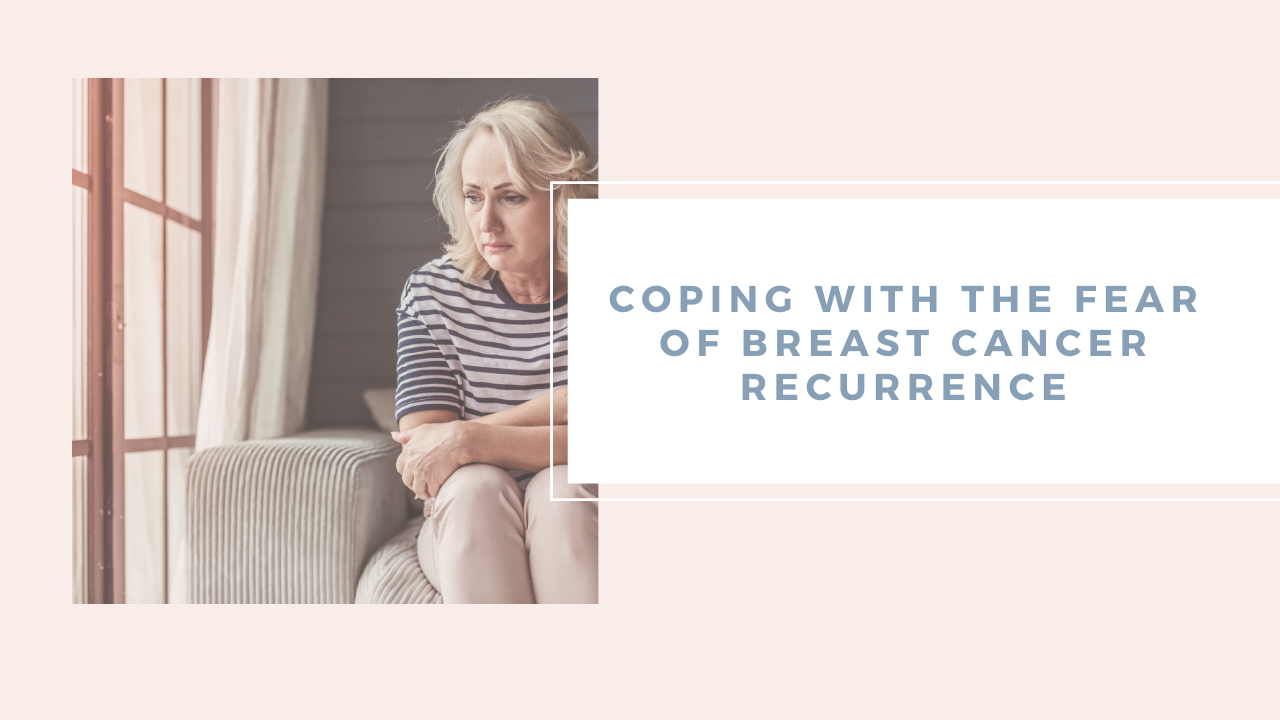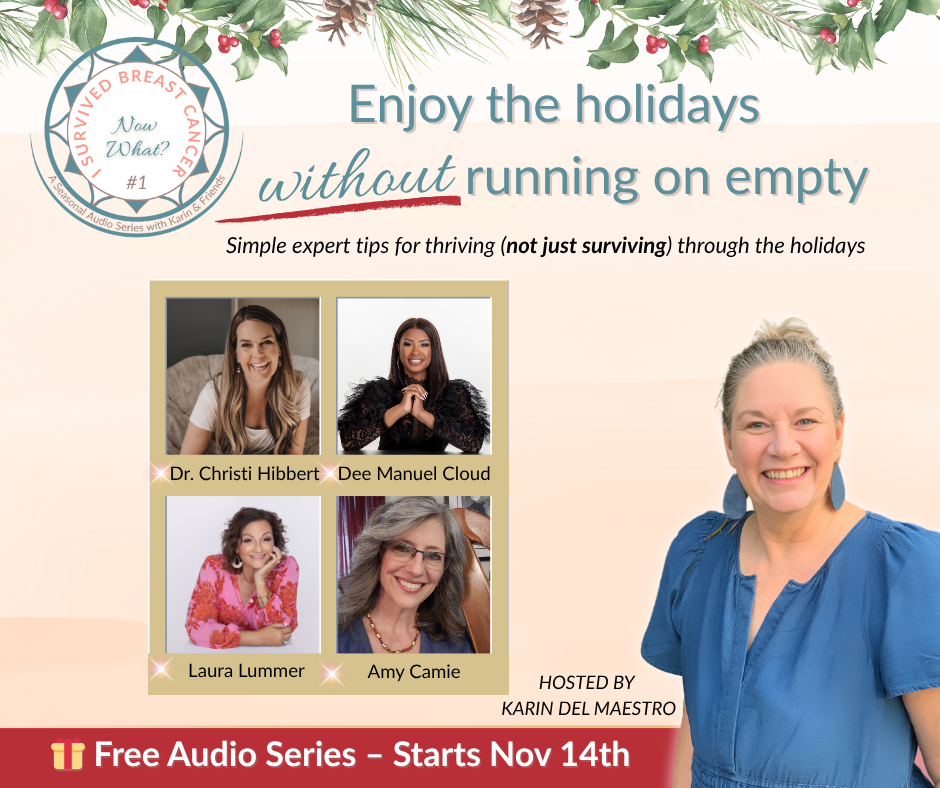Coping With Fear of Recurrence
Oct 15, 2020
After treatment ends, one of the most common concerns survivors have is that the cancer will come back. The fear of recurrence is very real and entirely normal.
Although you cannot control whether the breast cancer returns, you do have some control how much the fear of recurrence affects your life.
Today, I'd like to explore some of the things that I do, and help the survivors I work with to do, to help cope with this real and often paralyzing fear.
I invite you to try something new...you never know until you try something, what is going to work for you and what isn't.
I used to be the sweat it out kinda girl...I was an athlete, personal trainer and I loved being in the gym or out on my bike. My answer to any stress or anxiety was to push my body and sweat everything out...the problem with that, I wasn't processing my emotions. I was just numbing myself and pushing them down.
That and my addiction to shoes (I had over 200 pairs at one point), were my coping mechanism.
What I know now, is that neither of them were helping me to process and release pent up emotions...they were a quick fix, but nothing more than that.
When it comes to processing our emotions after breast cancer...this is CRUCIAL to both our breast health and reducing our risk of recurrence (the very thing we're afraid of!)
Let's take a look at some of the things you can do to cope with the fear of recurrence:
Living with uncertainty is never easy. It is important to remind yourself that fear and anxiety are normal parts of survivorship. Worrying about cancer coming back is usually most intense the first year after treatment. This worry usually gets better over time and I've found that the more proactive I become with my daily habits and how they can help reduce my risk of recurrence, it helps immensely, rather than passively waiting for the other shoe to drop.
Here are a few ideas to help you cope with the fear of recurrence:
-
Recognize your emotions. Many people try to hide or ignore “negative” feelings like fear and anxiety. Ignoring them only allows them to become stronger and more overwhelming. It often helps to talk about your fears with a trusted friend, family member, or mental health professional. Talking out loud about your concerns may help you figure out the reasons behind your fears. This might include the fear of having to repeat cancer treatment, losing control over your life, or facing death. You can also try writing down your thoughts.
-
Don’t ignore your fears. Telling yourself not to worry or criticizing yourself for being afraid will not make these feelings go away. Accept that you are going to experience some fear, and focus on ways to manage the anxiety. Be aware that your anxiety may temporarily increase at specific times. These may include follow-up care appointments, the anniversary of your diagnosis, or someone else’s cancer diagnosis. Sometimes, what you are worrying about may be unlikely. Talking to your health care team may help you figure out if your fears are likely.
-
Do not worry alone. Many cancer survivors find joining a support group to be helpful. Support groups offer the chance to share feelings and fears with others who understand. They also allow you to exchange practical information and helpful suggestions. The group experience often creates a sense of belonging that helps survivors feel less alone and more understood. I host a FREE monthly support group over in my Facebook Community: Healthy Living After Breast Cancer ...I'd love to have you join us!
-
Reduce stress. Finding ways to manage stress will help lower your overall level of anxiety. Try different ways of reducing stress to find out what works best for you. This could include:
-
Spending time with family and friends
-
Focusing on hobbies and other activities you enjoy
-
Taking a walk, meditating, or enjoying a bath
-
Exercising regularly
-
Reading a funny book or watching a funny movie
-
-
Be well informed. Most cancers have a predictable pattern of recurrence. But no one can tell you exactly what will happen in the future. A health care professional who knows your medical history can tell you about the chances of the cancer returning. He or she can also tell you what symptoms to look for. Knowing what to expect may help you stop worrying that every ache or pain means the cancer has returned. If you do experience a symptom that does not go away or gets worse, talk with your health care team.
-
Talk with your health care team about follow-up care. One goal of follow-up care is to check for a recurrence of cancer. Your follow-up care plan may include regular physical examinations and/or medical tests to keep track of your recovery. Having a regular schedule of follow-up visits can provide survivors with a sense of control.
-
Make healthy choices. Healthy habits like eating clean nutritious foods and getting enough sleep help people feel better both physically and emotionally. Avoiding unhealthy habits, like smoking and excessive drinking helps people feel like they have more control over their health.
When you need more help
You might find yourself overwhelmed by fear or anxiety even after your best efforts to cope with it. The following feelings may indicate more serious anxiety or depression:
-
Worry or anxiety that gets in the way of your relationships and daily activities or prevents you from going to your follow-up care appointments
-
Feeling hopeless about the future
-
Having trouble sleeping or eating well
-
Not participating in activities you used to enjoy
-
Having trouble concentrating or making decisions
-
Feeling that you have nothing to look forward to
-
Being unusually forgetful
If you are concerned about anything on this list, talk with your health care team or cancer rehab team.
I made myself a promise after my breast cancer and BRCA2 diagnosis...to do EVERYTHING in my power to NOT get his disease again.
Not only did I make this promise to myself, but also to you!
This is just one of the things I'll be covering in more depth inside the FREE 5-Day Facebook LIVE series: What to Expect After Breast Cancer Treatment Ends and you're invited!
SIMPLY CLICK HERE TO LEARN MORE
This list is based on information from Cancer.Net



